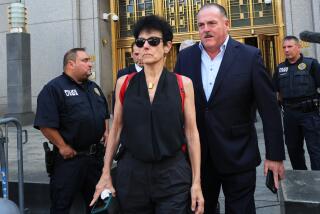Balance Is Crucial When Business Is Family Affair
At Bridgford Foods Corp. in Anaheim, rigid equality is the rule in executive compensation and family affairs alike. Chairman William H. Bridgford and his two sons, President Allan Bridgford and Vice President Hugh Bridgford, each earned $330,650 last year.
Ropak Corp., a Fullerton plastics company, is nearly as egalitarian. Chairman William H. Roper and his brothers, President Robert E. Roper and Vice President C. Richard Roper, took home nearly the same amount in 1989, with William coming out a touch on top at $186,000.
The father-son team at Unicare Financial Corp. in Irvine, Ralph and Russell Leatherby, also seems to have a family scale, with founder Ralph earning just $10,000 more than the $143,000 his son made last year.
In each of these cases, though, monetary equality is a byproduct of a close working relationship among the family members. And those involved with family-run public companies say that how much the top executives pay themselves has far less bearing on the companies’ future than the fashion in which they pass on dividends to their children.
“Family businesses face a built-in conflict between the values that drive family relationships and the values that drive business,” said Ernest A. Doud Jr., a family business consultant at Laventhol & Horwath in Los Angeles. The urge to treat all family members equally--no matter what their contribution to the business--is just one of the many pitfalls that family companies, whether public or private, must somehow avoid.
Because it is home to many young and fast-growing companies, Orange County has a plethora of firms that are publicly traded but still effectively controlled by the founders or their descendants. Though public ownership imposes certain constraints on the manner in which a company can be used to benefit a family, Doud said, controlling families can still “get away with just about anything” and thus must face the same sticky issues of succession and stock transfer as private family companies.
Conflicts among heirs of the founders have racked many a successful firm nationwide, including Johnson & Johnson and Campbell Soup. The family war over the U-Haul truck rental company even resulted in public fisticuffs among brothers.
And even where no outright conflict exists, family-controlled firms must find a balance between blood loyalty and management necessity.
Local firms have taken a wide range of approaches to these problems. Emil and Robert Martini, the two brothers who built Bergen Brunswig Corp. in Orange from a small pharmaceutical distributor into a corporation with $3.9 billion in annual sales, took a simple, if uncommon, tack: They ceded family control.
The two brothers, who took over the company from their father in the 1960s, exercised complete control over the company through ownership of 90% of the class B stock. But although Emil’s two sons and Robert’s son were all involved in the business, said company spokesman Jack Fay, they were not in line to take over the management. The brothers had to decide what would happen to the controlling shares after they left the scene.
The solution was a plan, approved by Bergen Brunswig shareholders last year, to convert all the class B shares to common shares over five years--at a substantial premium--and thus put control of the company in the hands of all stockholders. The move was praised by Institutional Shareholder Services Inc., an independent adviser to institutional investors, as “a model of fiduciary responsibility,” and the problem of succession was thus dispatched.
Bridgford Foods Corp., a wholesaler of processed food products, is going in the opposite direction. Allan Bridgford said that his son, his brother’s three sons, and two sons of a third brother who was killed in a traffic accident in the 1950s are all involved in the business and will probably accede to the top management jobs.
He seems unconcerned about possible conflicts among them, trusting that they will be able to duplicate the 30 years of harmonious collective management that he, his father and his brother have accomplished.
“They seem to get along very well, and they’ll continue to operate the business by committee for the next 30 or 40 years,” Allan Bridgford said.
Carl Karcher Enterprises, one of the best-known family firms in the county, has found a different way of compensating the founders’ descendants: handing out franchises. Spokeswoman Patricia Parks said that Carl Karcher’s two sons and his daughter, as well as his brother Don’s daughter, are all owners of Carl’s Jr. fast-food franchises. Corporate management, on the other hand, will soon pass to non-family members.
First American Financial Corp. of Santa Ana, a major title insurance company, has already weathered one storm resulting from family friction. Donald P. Kennedy, a grandson of the company’s founder who assumed the helm in 1963, recalled that his uncle, Ted Kennedy, took a job with the company in the early 1950s and “it didn’t work out very well.”
Eventually, his uncle decided to sell his 18% stake in the firm to Commerce Savings, a Texas savings and loan that eventually went bankrupt. Donald Kennedy said that having a failing thrift as a major shareholder created numerous problems and increased First American’s exposure to a hostile takeover, and the company eventually bought the stake back.
Currently, the Kennedy clan owns less than 10% of First American’s stock, but that has not prevented Donald’s son Parker from taking over as president of the company’s major operating subsidiary. Donald Kennedy emphasized, however, that his son had earned the job through his strong performance in managing the company’s national expansion.
Russell E. Leatherby is one son-of-boss who doesn’t have to worry too much about perceptions of favoritism: He has been with Unicare, a workers’ compensation insurance underwriter, since its inception in 1980. And he said that his law degree assured that he “had a specific role to play.” Now he is gradually assuming the helm from his father, Ralph, with whom he has “never had a harsh exchange of words.”
William Roper of Ropak Corp. just wishes he had to face the family succession problem. He sounds almost wistful about the fact that although he has two nephews who work for the company, they will not be in the top management ranks.
“It’s their decision--they don’t have the same motivations we did,” he said.
When he and his brothers begin to disengage from the firm, they will probably liquidate their 30% ownership position, Roper said. In the end, he noted, “we’re a public company, not a family business.”
ALL IN THE FAMILY
Compensation for family members of some of Orange County’s larger public companies.
1989 salary Company/Executive Age Title & Bonus Bergen Brunswick Corp. Emil P. Martini, Jr. 61 Chairman and CEO $596,860 Robert E. Martini, 57 President 403,913 Bridgford Foods Corp. H. William Bridgford 58 Chairman 330,650 Allan L. Bridgford 55 President 330,650 Hugh H. Bridgford 81 Chairman, Exec. Com. 330,650 Carl Karcher Enterprises Inc. Carl N. Karcher 73 Chairman and CEO 398,169 Donald F. Karcher 62 President and COO 282,491 Clothestime, Inc. Michael P. DeAngelo 41 Chairman and CEO 430,152 Raymond A. DeAngelo 38 Vice Chairman 429,948 Community Psychiatric Centers Inc. James W. Conte 61 President and CEO 450,000 Richard L. Conte 35 Exec. VP 200,000 FHP International Corp. Robert Gumbiner 66 Chairman 1,212,000 Burke F. Gumbiner 38 Sr. VP 220,000 First American Financial Corp. Donald P. Kennedy 71 President 290,920 Parker S. Kennedy 42 Exec. VP 155,940 Ropak Corp. William H. Roper 61 Chairman 186,341 Robert E. Roper 57 President 171,244 C. Richard Roper 54 VP and Secretary 168,612 Safeguard Health Enterprises Inc. Alvin M. Baileys 67 Chairman and CEO 250,000 Steven J. Baileys 36 President and COO 240,000 Ronald I. Brendzel 40 Sr. VP and CFO 140,000 Unicare Financial Corp. Ralph W. Leatherby 64 Chairman and CEO 153,210 Russel E. Leatherby 36 President and COO 143,354
Source: Company proxy statements
More to Read
Inside the business of entertainment
The Wide Shot brings you news, analysis and insights on everything from streaming wars to production — and what it all means for the future.
You may occasionally receive promotional content from the Los Angeles Times.










